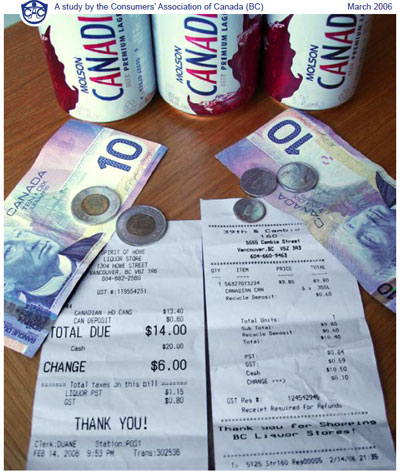This is an archive of news stories and research from the National Union of Public and General Employees. Please see our new site - https://nupge.ca - for the most current information.
'The facts clearly show that privatization of liquor stores in New Brunswick is just bad public policy.'
By Larry Brown
National Secretary-Treasurer
National Union of Public and General Employees (NUPGE)
 Ottawa (31 Jan. 2011) - The new Conservative government of New Brunswick recently floated out the idea of selling off NB Liquor, the profitable crown corporation responsible for the purchase, importation, distribution and retail sales of alcohol beverages in the province.
Ottawa (31 Jan. 2011) - The new Conservative government of New Brunswick recently floated out the idea of selling off NB Liquor, the profitable crown corporation responsible for the purchase, importation, distribution and retail sales of alcohol beverages in the province.
Over the years similar proposals have been considered and rejected by other provinces across the country – based on the fact the proposals were ultimately found to be simply bad public policy.
The one exception is Alberta, where the provincial government went ahead with the privatization of liquor stores in 1993.
Recently an article entitled Examining the Alberta Experience by Quentin Casey was published in the Saint John Telegraph-Journal claiming the Alberta move to privatize liquor stores as a huge success and suggesting that the new N.B. government do the same.
Mr. Casey's article presented a one-sided case which deserves to be challenged. His economic argument for privatization is questionable. It also completely ignores the health and social consequences of giving the sale of alcohol over to private retailers.
Consider, for example, a new joint study released last week by the University of Victoria's Centre for Addiction Research and the Prevention Research Center in California. It found a 27.5% increase in alcohol-related deaths for every new private liquor store per 1,000 British Columbians.
The study followed the impact between 2003 and 2008 of the dramatic increase of private liquor stores operating in B.C.
The lead author of the study, Dr. Tim Stockwell, points out that “private liquor stores are superior at maximizing sales and consumption of alcohol and related harms”. This is certainly shown true in Alberta, which has the highest alcohol consumption rate of any province in Canada and one of the highest alcohol-related crime rates.
It would also be wise to consider the views of Mothers Against Drunk Driving (MADD Canada) on the private retailing of alcohol. MADD Canada issued a national statement in 2009 which strongly supports the sale of alcohol through provincial liquor boards. MADD states that such a system “protects the public interest and meets consumer needs through safe and responsible alcohol sales."
However, NB Liquor's contribution to society is larger than its mandate to sell products in a socially responsible manner. It provides in excess of $160 million in revenue a year to help finance important public services that improve the quality of life for all New Brunswickers. Those revenues help reduce wait times in emergency rooms, create more spaces for early childhood learning, ensure clean drinking water and safe food and build a better quality of life for seniors and persons with disabilities.
 |
Mr. Casey’s argument that private retailing of alcohol benefits consumers is also questionable. According to the Consumers' Association of Canada (CAC), the privatization of liquor outlets has “forced consumers to pay millions of dollars more for beer, wine and liquor." In a 2006 survey, the association compared 43 major beer, wine and spirits products and found private stores were consistently more expensive than government stores – often 10% to 20% more.
Statistics Canada research shows that Alberta had the highest increase in the costs of alcohol for the years 2008 (3.0%) and 2009 (5.7%). The average provincial increase across Canada at public stores was 1.9% in 2008 and 0.9% in 2009.
He also mentions that Alberta’s dramatic expansion of private liquor stores has almost doubled the revenue going to the provincial government in the past two decades (a 179% increase to be exact).
Well it might be worthwhile to compare this to the increase in revenues the government-run Ontario Liquor Control Board of Ontario (LCBO) brought into that province over the past two decades. In 1990-91, the LCBO earned $650 million for the province; in 2009-10, LCBO earned $1.4 billion for the provincial government. That’s a 215 percent rise in revenue for the province in less than two decades – not bad for a crown corporation that only operates 661 outlets.
Why destroy an effective and efficient system that has existed for over 80 years just for the benefit of private retailers?
New Brunswickers are well served by NB Liquor. Its network of 48 retail outlets provides customers with great choices from close to 2,000 products from Canada and around the world. Consumers also can rely on professional advice on product selection from highly-knowledgeable public employees.
You’re not going to get that same selection and knowledge from a private retailer who is selling the product at his gas station or hardware store.
The facts clearly show that privatization of liquor stores in New Brunswick is just bad public policy, being advocated by a few who see an opportunity to make big bucks at the expense of the citizens of New Brunswick. Don’t be fooled. Public liquor stores are a good deal for consumers and taxpayers.
NUPGE
The National Union of Public and General Employees (NUPGE) is one of Canada's largest labour organizations with over 340,000 members. Our mission is to improve the lives of working families and to build a stronger Canada by ensuring our common wealth is used for the common good. NUPGE
